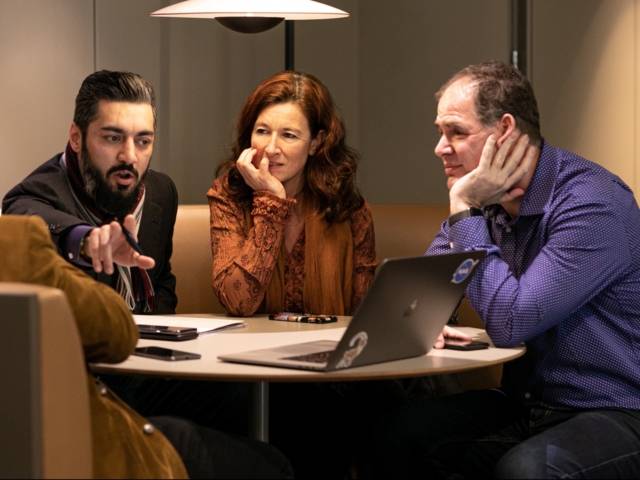Universities go Beyond CMS Solutions as DXPs Make the Grade

The following situation is a snapshot of the digital dysfunction that still characterizes academic institutions. Responding to student demand for more and better digital experience and engagement, a London university ramped up its online teaching yet did so through Microsoft Teams, Zoom, and Blackboard Learn indiscriminately, even on the same courses. Occasionally, lecturers would switch from Zoom to Teams or vice versa halfway through a semester for reasons that were never made clear to the students. Lessons were recorded but ended up in different “shared” databases that were highly unintuitive to access and were effectively a wasted resource. There was (and still is) considerable confusion around lecturers using personal Zoom or Microsoft Teams accounts, which runs afoul of data security and compliance.
While some academics are more confident with new technologies than others, the disjointed experience at the London institution is by no means untypical and the result of a broader digital malaise that universities (alongside numerous companies from various industries) have struggled to resolve for many years.
Getting online teaching right is part of digital transformation, but only a small part – just as ecommerce is about much more than putting your catalog of products or range of services on a website.
Students and teaching staff have the natural expectation of a fluid and connected digital experience from their university because this is what they are already getting as modern consumers of goods and financial services. Institutions that fail to provide such an experience risk fading into irrelevance while attracting fewer students and cutting-edge researchers.
In this article, we briefly explore the challenges faced by universities in building a resonant, efficient, and future-proof digital infrastructure which could not have been achieved through a basic Content Management System (CMS). We then explain how Ibexa DXP helped a leading digital university streamline and automate workflows across more than 3,000 courses.
CMS software cannot deliver transformation
Digital transformation in higher education has many aspects:
- Content - of which there is an almost infinite amount
- Legacy - with faculties and administrative functions each “doing their own thing”, accreting layers of siloed legacy
- Stakeholders - because students, applicants, staff, researchers, and administrators use the site for different reasons and so each needs their own unique customer experience
When it comes to content, even the best WordPress-type CMS can come up against limitations. Universities struggle to offer complete, up-to-date, and consistent information about hundreds of thousands and even millions of assets that include course material and assessment submissions, dissertations, research papers, grant applications, academic periodicals, patents, and much more. Typically, this data is siloed and/ or duplicated across different sources, often in different formats, making it difficult to access and impractical to distribute.
CMS solutions may be able to ingest a lot of inert content, but they struggle to correlate it dynamically across different systems and contexts. Digital Experience Platforms (DXPs) are much more interoperable with third-party capabilities to overcome legacy and harmonize content.
The technology where students and teachers intersect is the Learning Management System (LMS). As we shall see, not all universities use the same platform across different disciplines or campuses. The complications do not end there because learning is only one part of the student experience. Financing, mental health, career planning, and academic “red flags” such as repeated late submissions and alleged cheating or plagiarism are all part of that 360° view of students that universities want to build as they progress toward digital maturity. This process requires sensitive and watertight permissioning to protect student privacy – something that can be done quickly and intuitively in Ibexa DXP.
To sum up, lecturers often struggle with fractured and disjointed processes that hinder their effectiveness and take up too much of their time. In this situation, staff and students act as the digital glue for workflows and services that should have been digitally joined in the first place.
In our use case, we shall see how one institution leveraged Ibexa DXP to deliver an automated and joined-up workflow for its lecturers and administrators.
UNIR case study: three LMS, one source of content
The International University of La Rioja (UNIR) is not a classical university transitioning to the digital model of learning delivery; all its courses are taught online. However, with 60,000 students working towards more than 300 accredited degrees, UNIR rivals traditional centers of higher education in terms of range, ambition, and outcomes.
UNIR belongs to the PROEDUCA Group alongside CUNIMAD in Spain and – on the other side of the Atlantic – UNIR Mexico, Fundación Colombia, the Newman Graduate School in Peru, and MIU City University Miami. The online teaching model does not restrict its reach to a particular region, and the universities under the PROEDUCA umbrella are accessed by students from 90 countries worldwide.
The principal challenge faced by UNIR and its sibling campuses was the harmonization of content processes across three distinct Learning Management Systems: Canvas, Sakai, and Moodle.
Content created for MIU City University had to be uploaded manually into Moodle, which is the LMS in Miami. But if it was then decided to offer this great new course in UNIR Spain, content editors had to start from scratch to put the assets into Canvas.
It was also impossible to automate the delivery of identical content across different courses on the same LMS, as is often necessary.
In short, content management and distribution were a highly complicated and inefficient process. An attempt to mitigate the situation with a different CMS failed because the system lacked the necessary power and interoperability.
At this point, UNIR took a different direction and rebooted its project with Ibexa DXP.
We do not have the scope here to go into the details of this ambitious project. In highlighting the role of the technology platform, Ibexa DXP, we are in no way minimizing the contribution of UNIR’s partner, Infinitum Digital, and of the university itself.
Project phases included:
- Converting all the content stored in more than 4,000 unstructured documents into structured information that can be processed more efficiently.
- Building a content preview in the backend in HTML and PDF to leverage the editing options in Ibexa DXP to edit and validate course material.
- Developing a control panel in Ibexa DXP to integrate the different LMS solutions to facilitate agile and scalable content management to Sakai, Moodle, and Canvas.
- Leveraging the headless capabilities of Ibexa DXP for the correct distribution of content in PDF, HTML, and XML, but without renouncing other formats in the future.
- Deploying Ibexa DXP’s robust content modeling and interchangeable hierarchical structure to facilitate end-to-end management and synchronization across different classrooms on each campus.
- Using the Ibexa DXP repository as a global solution to federate content and enable universal access for all publishers in the group.
The project is far from over. Future plans include extending the scope of Ibexa DXP to other areas of the educational business, such as contract management or the creation of customized dashboards for different administrator roles.
UNIR’s ongoing digital transformation is living up to its promise because the consolidation of content editing, distribution, and re-use across different systems, campuses, and classrooms has been game changing. It is saving UNIR time and money while strengthening its core message of how borderless, virtual education is the way of the future.
Conclusion
Education is a business like no other, but it is still a business – and one on which the future of our cultures and economies depends. Its customers have been immersed in digital technologies all their lives and expect to move fluidly and unselfconsciously from a classroom setting to a digital context without “pain points”.
For the universities themselves, CMS software is unable to resolve the many pain points built up over decades of ad hoc digital solutions and structural fragmentation of faculty, administration, and campus (or campuses as we saw with UNIR).
University CIOs are well aware of this and are strategizing to mitigate this fragmentation. A Gartner1 survey of higher education CIOs and technology executives saw a consensus that investment in “Total Experience Solutions” is being ramped up in 2023.
As a total experience solution for universities, Ibexa DXP comes top of the class for its robustness, flexibility, and pragmatism. Because its architecture is modular or “composable”, Ibexa DXP enables institutions to phase in transformative change step by step while remaining agile about outcomes and strategic goals.
If you want to share your challenges and goals with us, we will of course be happy to give you a demo and discuss a syllabus for change.
Discover how we can help you with your Digital Transformation
Book a meeting with an Expert
Let's talk about how we can help you. From a 15-minute discovery call to a short demo of our technology, we can advise and recommend the right solution at all stages of your digital transformation.

